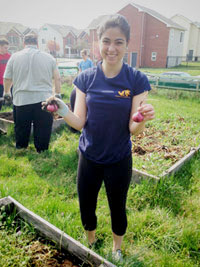Q&A with Student Samantha Beaino: Replicable Sustainable Farming Programs
January 21, 2014
 Samantha Beaino, an undergraduate student in the Nutrition Sciences Department at the College of Nursing and Health Professions, was recently awarded the Urban Sustainability Initiative Fellowship Grant (USI) for a total of $7,500. Sam will be working alongside her mentor, Dr. Brandy-Joe Milliron, an assistant professor in the Department of Nutrition Sciences, to complete the research project.
Samantha Beaino, an undergraduate student in the Nutrition Sciences Department at the College of Nursing and Health Professions, was recently awarded the Urban Sustainability Initiative Fellowship Grant (USI) for a total of $7,500. Sam will be working alongside her mentor, Dr. Brandy-Joe Milliron, an assistant professor in the Department of Nutrition Sciences, to complete the research project.
Chartings: Tell us about your project and about the grant application process.
Samantha Beaino: The USI fellows program awards 6 students a mentored research opportunity to advance research in the area of Urban Sustainability and provide multidisciplinary training. To apply for the fellowship, Dr. Brandy-Joe Milliron (Department of Nutrition Sciences) and I discussed research options that aligned with my personal and professional interests in nutrition, agriculture, and the community. We approached Greener Partners, a non-profit organization and leader in the sustainable farming movement, to explore potential research projects that would be mutually beneficial. I submitted a research proposal, personal statement, resume, and budget; and my primary mentors, Dr. Milliron and Meg MacCurtin (the education director of Greener Partners) submitted two letters of support. The proposal criteria were that the project had to relate to environmental, social, or economic sustainability. Our overall research will address all three of these aspects of sustainability focusing on a maintainable food system. My application package was submitted to the USI Co-Leads for review over the winter break and we received a response that I was selected shortly thereafter.
Chartings: Where will the research project take place? Tell us about the site and the study design.
SB: The fellowship is a funded eight-month project. We will be conducting an impact evaluation of the SOL (Sustainable, Organic, Local) Food Project at Girard College to determine whether participation in the program is changing students’ knowledge in sustainable farming, nutrition and culinary skills, food justice, intergenerational communication, and dietary habits. The program’s mission is to support youth in creating sustainable communities for themselves and their neighbors, and having a voice in shaping the food system. During the school year, SOL Food is an after-school program and transitions to a “work ready” program during the summer. In the campus gardens, students grow and harvest their own foods for cooking demonstrations and also participate in farmer’s markets in the summer. Students also facilitate weekly topics including on food traditions, food sovereignty, community involvement, and food justice.
A baseline and post-intervention study design will evaluate change in student knowledge over each 10 week programming period. In the long run, this research will help Greener Partners improve their education programs and allow them to replicate the program in more schools, expanding their environmental and sustainable impact.
Chartings: Do you have any mentors who will work with you on this project?
SB: Guidance during this fellowship will be facilitated through my academic and community-based mentorship team. One of my primary mentors, Dr. Brandy-Joe Milliron, encouraged me to apply for this fellowship. She was my Community Nutrition professor during the fall quarter, just after I finished my co-op at 11th Street Family Health Services, where I worked on a variety of community nutrition programs. We are equally excited about this project and have already begun planning with Greener Partners.
My mentors from Greener Partners, Meg MacCurtin (Education Director) and Rania Campbell-Cobb (Teen Program Educator), are experts in sustainable farming and have many years of experience working in organic farming and farm-based education. Rania leads the SOL Food project at Girard College and I’ll be working with her weekly. In the fall term, they both visited our community nutrition class to demonstrate their Seed to Snack program. Their enthusiasm and passion for their work is infectious and I am really looking forward to learning from them as well. In addition to my primary mentors, faculty with expertise in urban sustainability will also provide mentorship through our training opportunities and monthly meetings.
Chartings: What are your goals for this project? What do you hope to accomplish?
SB: My goal for this project is to gain experience in community program evaluation methods and to contribute to the development of a sustainable model for the SOL Food Project. I hope to accomplish these goals by assisting Greener Partners through program evaluation research to help them better understand the effectiveness of SOL Food with the intent of developing a curriculum and replicable program.
Chartings: What are you looking forward to the most?
SB: I’m most looking forward to the dynamic learning opportunity this grant provides. For example, the awarded faculty mentors and students will have monthly journal club meetings and will be able to present their research at the annual USI symposium. Additionally, the opportunity will allow me to co-author scientific manuscripts that will be generated from this research. I am also very excited to collaborate with Greener Partners. After my first introduction to Greener Partners during a visit to Hillside Farms, their organic farm in Media, Pennsylvania, I became very interested in their community food access and education programs. Through this USI Fellowship opportunity I will be able to contribute to this important community initiative.